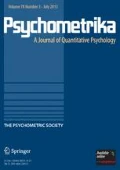Abstract
The paper opens with a brief discussion of the problems in testing nonlinear models of attitude change. The regression artifacts produced by unreliability are shown in both the linear and nonlinear case. Classical solutions for the linear case are quickly reviewed. A “new” solution to the linear case is presented and applied to the nonlinear case. It is shown to work well under a broad set of conditions. Regression artifacts in bivariate regression are then discussed. If the predictors are independent, then the univariate correction procedure can be applied to each predictor separately. But if the predictors are correlated, a joint correction procedure must be used. One such procedure is defined and shown to work perfectly in the case of linear regression and reasonably well in a broad set of conditions in which the regression is nonlinear.
Similar content being viewed by others
References
Anderson, N. H. Test of a model for opinion change.Journal of Abnormal and Social Psychology, 1959,59, 371–381.
Anderson, N. H. & Hovland, C. I. The representation of order effects in communications research. In C. I. Hovland (Ed.),The order of presentation in persuasion. New Haven: Yale University Press, 1957, pp. 158–169.
Bereiter, C. Some persisting dilemmas in the measurement of change. In C. W. Harris (Ed.),Problems in measuring change. Madison, Wis.: University of Wisconsin Press, 1963, 3–20.
Hunter, J. E. & Cohen, S. H. Mathematical models of attitude change in the passive communication context. Unpublished manuscript, 1972, pp. 250.
Lord, F. M. The measurement of growth.Educational and Psychological Measurement, 1956,16, 421–437.
Lord, F. M. An empirical study of the normality and independence of errors of measurement in test scores.Psychometrika, 1960,25, 91–104.
Lord, F. M. & Novick, M. R.Statistical theories of mental test scores. Reading, Mass: Addison-Wesley, 1968.
Osgood, C. E., Suci, G. J., & Tannenbaum, P. E.The measurement of meaning. Urbana, Illinois: University of Illinois Press, 1957.
Osgood, C. E. & Tannenbaum, P. E. The principle of congruity in the prediction of attitude change.Psychological Review, 1955,62, 42–55.
Tannenbaum, P. E. Attitudes toward source and concept as factors in attitude change through communications. Unpublished dissertation, University of Illinois, 1953.
Author information
Authors and Affiliations
Rights and permissions
About this article
Cite this article
Hunter, J.E., Cohen, S.H. Correcting for unreliability in nonlinear models of attitude change. Psychometrika 39, 445–468 (1974). https://doi.org/10.1007/BF02291668
Received:
Revised:
Published:
Issue Date:
DOI: https://doi.org/10.1007/BF02291668




